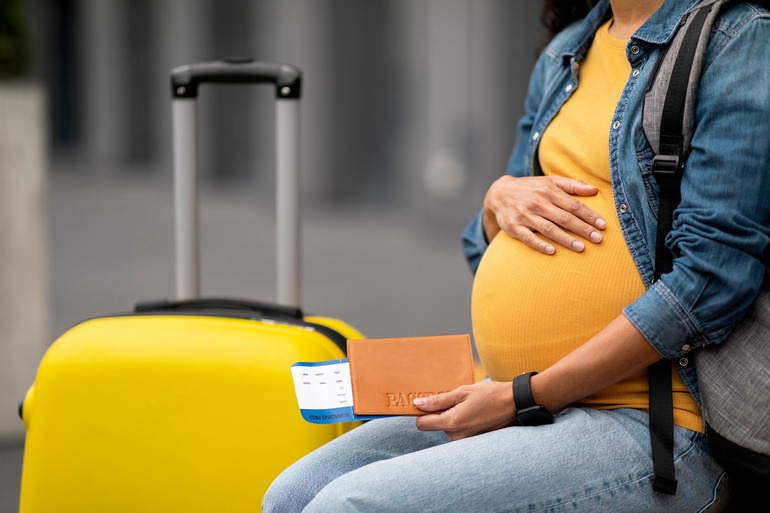Flying is usually safe up until 36 weeks into a healthy pregnancy. Pregnant women can travel domestically by air before the 36th week of pregnancy on most US airlines. After 28 weeks, several foreign flights have restrictions on travel.
It is generally not advised to fly if you have any pregnancy-related complications, such as:
- Before eclampsia
- Early membrane rupture
- Premature labor
- Before taking a flight while pregnant, be sure it’s safe for you by consulting your doctor.
In the final month of pregnancy, some airlines could also need a medical certificate from a physician. To learn about the airline’s policies and any necessary paperwork, give them a call in advance.
What are the various airlines’ policies?
Regarding flying during the third trimester of pregnancy, each airline has a slightly different policy. You must check the airline’s website or give them a call to confirm the rules before your journey.
For instance, there are now no limitations on flying while pregnant and no need for a medical certificate on Delta Airlines. However, if your due date is less than four weeks before your journey, American Airlines needs a doctor’s certificate. It needs to say that you’ve had a recent checkup and are good to fly.
If you are carrying more than one baby, airlines may also have various rules. According to British Airways policy, women who are pregnant with one child are not permitted to travel after the 36th week, while women who are pregnant with multiple babies are not permitted to fly after the 32nd week.
It’s a good idea to seek your healthcare physician for a medical certificate even if your airline doesn’t require one to travel, regardless of how far along you are in the pregnancy. Airlines have refused to let pregnant women board in the past, even though it’s not always obvious if it’s lawful for gate officials to inquire about the status of a pregnant passenger. Having a letter from your physician or midwife may calm your fears. You won’t have to stress about being let on the plane if you do that.
Airlines’ policies
The following lists the policies of some of the most well-known airlines worldwide; however, before making travel arrangements, you should always verify the policies of each airline on their website or by phone. It is better to communicate directly with the airline to find out their current policy, as they may change at any time.
| Up to 7 days before the expected delivery date | Able to fly | Unable to fly | 28+ weeks and if you’re carrying multiple |
| Air China | Single baby: 1-35 weeks, or more than 4 weeks from expected due date; Multiple babies: 4 weeks or more from expected delivery date | Up to 7 days before the expected delivery dateA | No |
| AirFrance | Throughout entire pregnancy | Not applicable | Not required |
| American Airlines | Within 4 weeks of the expected delivery date | 7 or fewer days from the expected delivery date | Single: 1-35 weeks, or within 4 weeks of the expected delivery date; Multiple: 1-28 weeks, or within 4 weeks of expected delivery date |
| Asiana Airlines | 1-36 weeks | Single: 37+ weeks; Multiple: 33+ weeks | 32-36 weeks |
| British Airways | Single: 1-36 weeks; Multiple: 1-32 weeks | Single: 37+ weeks; Multiple: 33+ weeks | Recommended but not required |
| Cathay Pacific | Single: 1-35 weeks; Multiple: 1-31 weeks | Single: 36+ weeks; Multiple: 32+ weeks | 28+ weeks |
| Delta Airlines | Throughout entire pregnancy | Not applicable | Not required |
| Emirates | Single: 1-35 weeks; Multiple: 1-31 weeks | Single: 36+ weeks unless cleared by Emirates Medical Services; Multiple: 32+ weeks unless cleared by Emirates Medical Services | 29+ weeks |
| Egypt Air | Throughout entire pregnancy | Not applicable | Within 4 weeks of expected delivery or for women carrying multiple babies or with known pregnancy complications |
| Lufthansa | 28+ weeks and if you’re carrying multiple | Single: 36+ weeks unless given medical clearance; Multiple: 29+ weeks unless given medical clearance | Recommended after 28 weeks; required after 36 weeks for singles and after 29 weeks for multiples |
| Qantas | Single baby and flight under 4 hours: 1-40 weeks; Single, baby and flight 4+ hours: 1-35 weeks; Multiple babies and flight under 4 hours: 1-35 weeks; Multiple babies and flight 4+ hours: 1-31 weeks | Single baby and flight under 4 hours: 41+ weeks; Single baby and flight 4+ hours: 36+ weeks; Multiple babies and flight under 4 hours: 36+ weeks; Multiple babies and flight 4+ hours: 32+ weeks | For travel after 28 weeks |
| Ryanair | Single: 1-35 weeks; Multiple: 1-31 weeks | Single: 36+ weeks; Multiple: 32+ weeks | For travel at or after 28 weeks |
| Singapore Airlines | Single: 1-36 weeks; Multiple: 1-32 weeks | Single: 37+ weeks; Multiple: 33+ weeks | Single: 29-36 weeks; Multiple: 29-32 weeks |
| Thai Air | Flights under 4 hours: 1-35 weeks; Flights 4+ hours: 1-33 weeks | Single: 36+ weeks for flights under 4 hours and 34+ weeks for flights 4+ hours; Medical approval needed for women carrying multiples | 28+ weeks and if you’re carrying multiples |
| Turkish Airlines | 1-27 weeks | Single: 36+ weeks; Multiple: 32+ weeks | 28+ weeks |
Traveling a long distance while pregnant
Domestic and local flights generally follow the same rules when it comes to long-distance travel during pregnancy. However, certain airlines may impose limitations on third-trimester pregnant women traveling abroad.
For instance, American Airlines requires permission from the special coordinator of the airline if you are traveling abroad within four weeks of your due date or seven days before or following your delivery. They will verify that you are cleared to fly after having a medical examination within the previous 48 hours before your departure.
The second trimester is the best time to travel if you intend to go far away from home or overseas while pregnant.
Flying, pregnancy, and DVT
Deep vein thrombosis (DVT) is more common among expectant mothers. DVT risk is also increased by flying.
Drink plenty of water and other fluids throughout your flight to avoid developing DVT. Along with dressing comfortably, you should get up on the plane frequently to stretch and take short walks. Get up and go for a stroll at least every two hours. Compression stockings are another option to minimize swelling in your lower legs and feet.
When pregnant, are metal detectors safe to use?
All travelers, including expectant mothers, are generally seen to be safe with modern imaging technologies and airport X-rays.
Instead of going via a metal detector, you ask to be patted down if you’re worried. Inform the airport security agent that you are expecting a child and that you would prefer a pat down. The screening will be done by a female security officer who will also explain the procedure to you.
Tips for pregnant women regarding safe travel
To ensure your safety and well-being when flying while pregnant, heed these tips:
- Put on flat shoes and loose clothing to ensure comfort.
- Before your journey, steer clear of gas-producing meals and carbonated beverages. Reserve an aisle seat so you can easily stretch your legs and use the restroom. Get up to stroll the aisles at least every two hours.
- Pack wholesome food for when you become hungry and remember to remain hydrated throughout the flight.
- A visit with your physician before to your vacation is also a smart idea. They can verify that you can travel safely.
- Traveling to any country where the Zika virus is present is not advised if you are pregnant. Current travel advisories are available from the Centers for Disease Control and Prevention.
- In case of an emergency while traveling, find out which hospital is closest to your destination before you go, and bring a copy of your prenatal documents in case you need to see a doctor while you’re gone.

